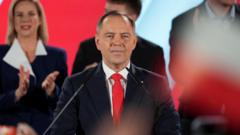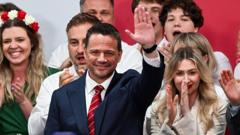As Poland prepares for a potential shift in leadership, the recent presidential runoff election has captivated voters and observers alike. The race between liberal Warsaw Mayor Rafal Trzaskowski and nationalist historian Karol Nawrocki is a reflection of the intense ideological divides in the country.
Poland's Presidential Election: A Contest of Ideologies

Poland's Presidential Election: A Contest of Ideologies
Sunday's runoff election reveals a pivotal moment in European politics, with results too close to call as two candidates vie for the presidency.
The election, which concluded on June 1, 2025, showcased a remarkable voter turnout of 72.8%, indicating high public engagement across Poland. Exit polls suggested Mr. Trzaskowski, supported by the centrist Civic Platform party, held a slight lead with 50.3% of the votes, while Mr. Nawrocki trailed closely behind at 49.7%. This razor-thin margin has instigated competing claims of victory from both candidates.
In a spirited declaration to his supporters, Trzaskowski exclaimed, “Dear ladies and gentlemen — we won!” echoing the sentiment that his narrow edge could mark a transformative moment in Polish politics. Conversely, Nawrocki continued to express confidence, insisting that the official count would ultimately validate his campaign’s efforts.
The election has further established Poland as a focal point in the ongoing debate surrounding populism and nationalism within Europe. The contrasting political affiliations of the two candidates have polarized public opinion, with Trzaskowski representing a more collaborative approach to governance in contrast to Nawrocki's nationalist agenda. This electoral contest lays bare a broader narrative regarding the future of populist movements across the continent, with implications beyond Poland's borders.
As the nation awaits official results, the stakes remain high. Should Trzaskowski prevail, it could signal a shift away from recent years of nationalist governance, potentially ending a long-standing political deadlock. In contrast, a win for Nawrocki could entrench the existing divisions further and maintain the status quo.
The tumultuous nature of this election underscores the evolving landscape of Polish politics and sets the stage for changes that could reverberate throughout Europe. As both sides prepare for the final tally, the implications of this election will likely resonate well into the future, shaping public discourse and policy direction for years to come.
In a spirited declaration to his supporters, Trzaskowski exclaimed, “Dear ladies and gentlemen — we won!” echoing the sentiment that his narrow edge could mark a transformative moment in Polish politics. Conversely, Nawrocki continued to express confidence, insisting that the official count would ultimately validate his campaign’s efforts.
The election has further established Poland as a focal point in the ongoing debate surrounding populism and nationalism within Europe. The contrasting political affiliations of the two candidates have polarized public opinion, with Trzaskowski representing a more collaborative approach to governance in contrast to Nawrocki's nationalist agenda. This electoral contest lays bare a broader narrative regarding the future of populist movements across the continent, with implications beyond Poland's borders.
As the nation awaits official results, the stakes remain high. Should Trzaskowski prevail, it could signal a shift away from recent years of nationalist governance, potentially ending a long-standing political deadlock. In contrast, a win for Nawrocki could entrench the existing divisions further and maintain the status quo.
The tumultuous nature of this election underscores the evolving landscape of Polish politics and sets the stage for changes that could reverberate throughout Europe. As both sides prepare for the final tally, the implications of this election will likely resonate well into the future, shaping public discourse and policy direction for years to come.





















